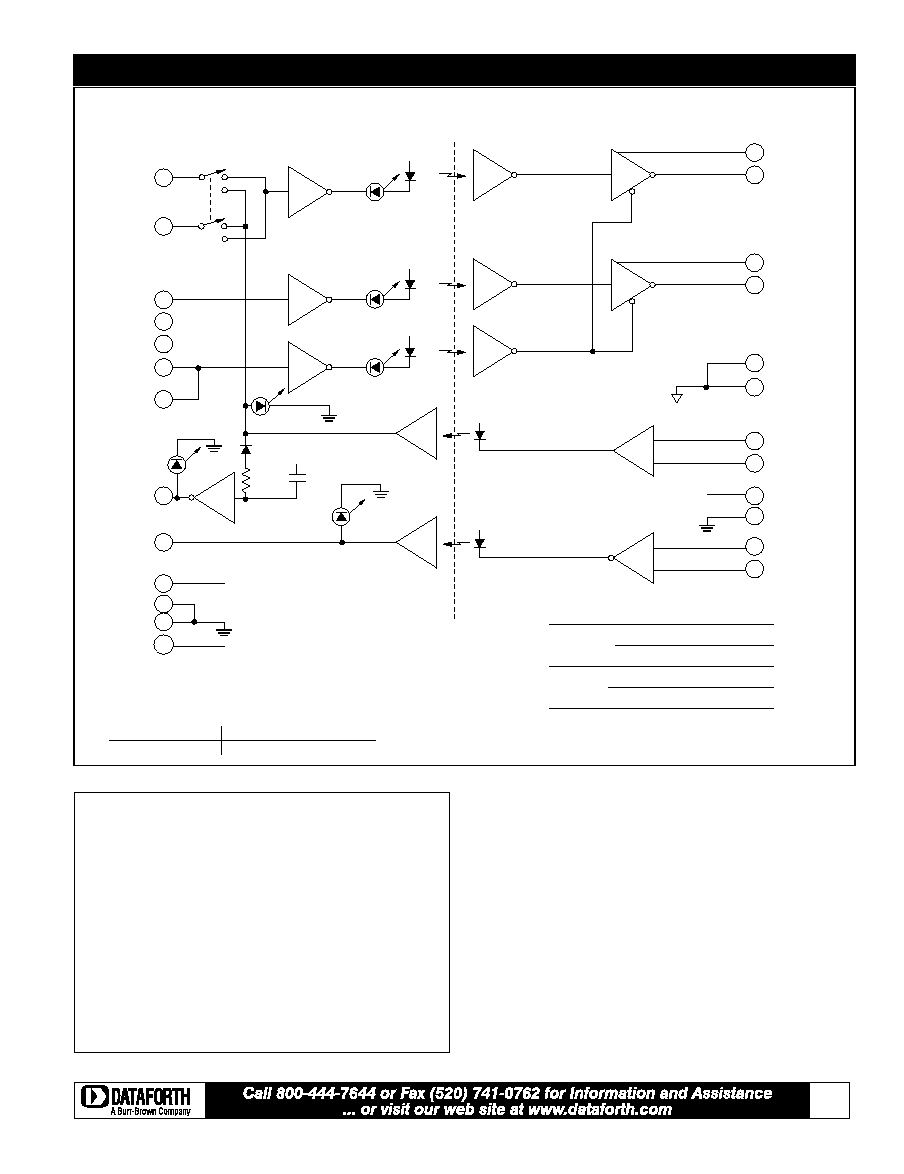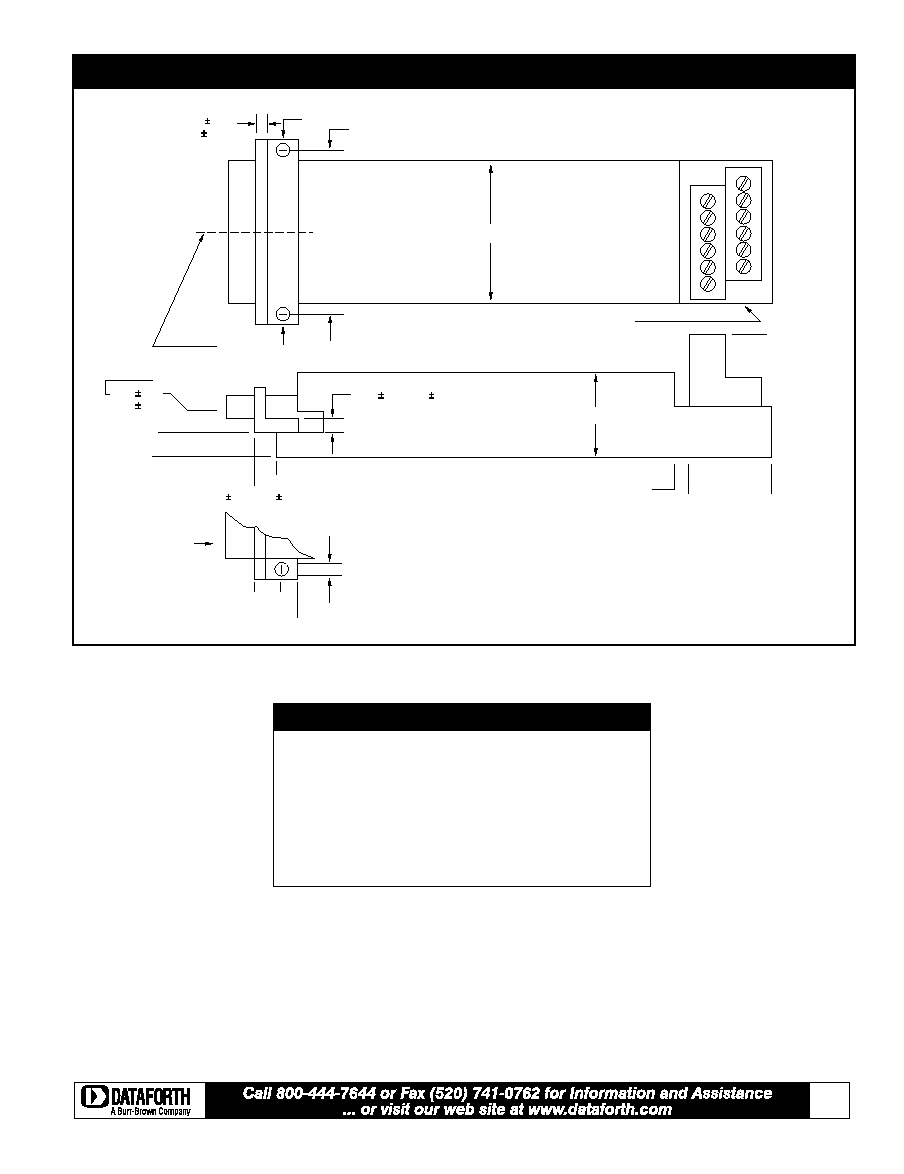 | ÐлекÑÑоннÑй компоненÑ: LDM422-PT | СкаÑаÑÑ:  PDF PDF  ZIP ZIP |
Äîêóìåíòàöèÿ è îïèñàíèÿ www.docs.chipfind.ru

18
®
Features
Á
COMPLETE ISOLATION WITH OPTICAL
COUPLERS AND POWER DC-TO-DC
CONVERTER
Á
INDUSTRIAL SURGE PROTECTION DEVICES
Á
SIX LED DIAGNOSTIC INDICATORS
Á
DC TO 19,200 BAUD AT 6000 FEET (1800M),
9600 BAUD AT 3 MILES (5KM)
Á
REQUEST-TO-SEND, CLEAR-TO-SEND
HANDSHAKE
Á
TRI-STATE OUTPUTS FOR MULTIDROP
APPLICATIONS
Á
SELECTION OF CONNECTORS
Á
WIDE OPERATION TEMPERATURE RANGE
Á
SOLDERLESS SCREW TERMINAL FIELD
CONNECTIONS
LDM422
Fully Isolated
Limited Distance Modem,
RS-232/422 Converter
Description
The LDM422 is a compact RS-232 to RS-422 converter which features
a complete electrical isolation barrier and heavy duty electrical surge
protectors. These devices feature a rugged aluminum enclosure small
enough to mount on the back panel of typical computer equipment,
saving valuable desk and floor space. Isolation is provided by optical
couplers and a DC-to-DC converter. The RS-232 connection is through
male or female EIA 25-pin connectors. The RS422 connections are
made through convenient solderless screw terminals.
The LDM422 series is designed for full duplex operation over two-
wire pairs. Outputs are tri-state, allowing multidropping of up to 32
units. Hardware handshake is available over two separate wire pairs.
Data rates are 75 to 19,200 baud. Six diagnostic LED indicators are
provided (see Figure 1) for installation guidance and system
troubleshooting. The RS-232 interface supports Request To Send,
Clear To Send, Data Set Ready, Received Line Signal Detect, and
Data Terminal Ready. A convenient null modem switch is provided for
the data lines. The RS-422 interface supports Request To Send and
Clear To Send on separate wire pairs. The LDM422 may be used to
convert two sets of send and receive channels by using RTS and CTS
circuits as the second data channels. Data rates are the same. The
units use 12VAC from a wall-mounted transformer or ±12VDC to
pins 9 (+) and 10 () of the RS-232 connector.
Specifications
Model
LDM422
Baud Rate Range
0 19.2K
Baud Rate
19.2K
9.6K
4.8K
2.4K
1.2K 0
Distance (miles)
1.14
3
4
5
7
Distance (km)
1.8
5
6.7
8.3
11.7
Maximum Multidrop
32. Reduced distances may be required when as
Units
many as 32 units are multidropped. No restrictions
apply for distances of 1 mile (1.7 km) or less.
Common Mode
Surge: 750V
Isolation
Continuous: 500V
Differential Mode
(AC input)
Surge Protection
ANSI/IEEE C37.90.1-1989
(9 devices)
(all RS-422 inputs and outputs)
Channel Lines
(1)
TD, RD, RTS, CTS
Control Lines
(1)
RTS, CTS, DTR, DSR, RLSD
Modes
Asynchronous 4-wire duplex, 2-wire half-duplex,
2-wire simplex
Model
LDM422
Null Modem Switch
1 (Reverses RS-232 pins 2 and 3)
RS-422 Output Drive
20mA min/output
RS-422 Input Impedance
6k
min/input
Power:
AC operation
(2)
12VAC, ±10%, 10W screw terms 1 & 2
DC operation
+11.5VDC to +17.0VDC @ 400mA on pin 9
-11.5VDC to -17.0VDC @ 400mA on pin 10
Operating Environment
0
°
C to +70
°
C 0 to 95% relative humidity,
noncondensing
Dimensions
6.6 in x 2.1 in x 1.28 in
(167.6 mm x 53.3 mm x 32.5 mm)
Weight
7 oz (200 g) max
PT3 and PT3E
11.0 oz (311.8 g) max
MTBF
(3)
>100,000 hrs
Notes: (1) TD = Transmit Data, RD = Receive Data, RTS = Request To Send, CTS =
Clear To Send. DTR = Data Terminal Ready, DSR = Data Set Ready, RLSD = Received
Line Signal Detect. (2) 120VAC and 220VAC power transformers are available. (3) Ground-
benign environmental conditions (no salt atmosphere, <50
°
C ambient temperature).
Dataforth does not authorize or warrant its products for use in life support/critical applications.

19
®
Figure 1. LDM422 Logic Diagram
TD
RD
RTS
Echo Sup.
Echo Sup.
DTR
DSR
RLSD
CTS
+ 12VDC
Gnd
Case
RLSD
RD
DCE
DTE
TD
RTS
DTR
Light = High = Space
+ V
CTS
* Light = High = Asserted
+ V
+ V
Light = Low = TD/RTS Enabled
Light = Low = Asserted
Light = Low = Space
+
-
+
-
B'
A'
RD
12VAC
PWR RTN
A'
B'
CTS
Opto-Iso
Barrier
+ V
+ V
+ V
-12VDC
B
B
A
A
TD
RTS
SIG RTN
SIG RTN
(Isolated RS-422 Ground)
* "Light"is presence of light
across Opto-Iso barrier.
2
8
4
9
7
3
12
11
10
1
2
5
6
3
4
16
17
20
6
8
5
9
7
1
10
RS-232
P1
RS-422
P2
TD, RD
RTS, CTS, DTR, RLSD
Mark = -V; Space = + V
Asserted = + V, Not Asserted = -V
Mark
Space
Asserted
Not Asserted
A or A'
Low
High
High
Low
B or B'
High
Low
Low
High
NOTE: Open or Tri-State on RD inputs produces
same logic condition as 'MARK' input. Open or
Tri-State on CTS inputs produces same logic
condition as 'Asserted' input.
TD, RD
RTS, CTS
RS-232 P1 P
RS-232 P1 P
RS-232 P1 P
RS-232 P1 P
RS-232 P1 Pin Descriptions
in Descriptions
in Descriptions
in Descriptions
in Descriptions
RS-422 P2 P
RS-422 P2 P
RS-422 P2 P
RS-422 P2 P
RS-422 P2 Pin Descriptions
in Descriptions
in Descriptions
in Descriptions
in Descriptions
Pin 1
Case
Case Ground
Pin 1
12VAC
Pin 2
TD
Transmit Data
Pin 2
PWR RTN
Pin 3
RD
Receive Data
Pin 3
RTS A
Pin 4
RTS
Request To Send
Pin 4
RTS B
Pin 5
CTS
Clear To Send
Pin 5
CTS A'
Pin 6
DSR
Data Set Ready
Pin 6
CTS B'
(connected to Data
Pin 7
TD A
Terminal Ready)
Pin 8
TD B
Pin 7
GND
Pin 9
SIG RTN
Pin 8
RLSD
Receive Line Signal Detect Pin 10
RD A'
Pin 9
+12VDC
Positive DC Supply Input
Pin 11
RD B'
Pin 10
12VDC
Negative DC Supply Input
Pin 12
SIG RTN
Pin 16
Echo Sup Echo Suppression
(tie to pin 17 to enable)
Pin 17
Echo Sup Echo Suppression
(tie to pin 16 to enable)
Pin 20
DTR
Data Terminal Ready
(connected to Data
Set Ready)
The LDM422 conforms to EIA RS-232 and RS-422 specifications.
Data Terminal Ready must be asserted by the host RS-232 port before
the LDM422 can transmit data. When Data Terminal Ready is not
asserted all outputs of the LDM422 are high impedance, allowing up
to 32 LDM422 units to be multidropped on a common
communications cable. See Figures 1 and 3 for details.
Request To Send and Clear To Send are carried through the RS-422
port as two separate wire pairs. These may be used for full duplex
flow control.
Cable Capacitance Effects On Distances
Specified distances in the specifications are for the wire sizes 18-
24AWG (0.82-0.20mm
2
) with a maximum capacitance of 25pF/ft
(82pF/m). For higher capacitance cables, decrease distance

20
®
Notes: (1) For data channels MARK is A negative relative to B. (2) For control lines Assertion
is A positive relative to B. (3) RTS = Request To Send, CTS = Clear To Send, TD =
Transmitted Data, RD = Received Data. (4) Recommended wire sizes are 14AWG to 22AWG.
Belden 8442 or Signal 1172 are typical low cost, nonshielded, twisted pair cables for use
with LDM422. (5) Signal return is not required. Cable shield, if used, should be connected
to SIGNAL RTN. (6) For the data rates of the LDM422, termination resistors are not normally
needed. If desired they may be easily attached to the screw terminals. Use a 220
resistor
across receiver A' and B' terminals at the extreme ends of the cable.
Figure 2. Field Wiring, LDM to LDM
Unit 1
Unit 2
Function
Function
Terminal
Terminal
12VAC
PWR RTN
(local)
A
B
A'
B'
A
B
A'
B'
RTS
Output
CTS
Input
TD
Output
RD
Input
SIGNAL RTN
SIGNAL RTN
12VAC
PWR RTN
(local)
A'
B'
A
B
A'
B'
A
B
SIGNAL RTN
SIGNAL RTN
1
2
3
4
5
6
7
8
10
11
9
12
1
2
3
4
5
6
1
2
5
6
3
4
10
11
7
8
9
12
7
8
9
10
11
12
Note: Signal return
not required. Shield
connection if used.
specifications for 2400 baud and above by a proportionate amount.
For example, shielded cable with 50pF/ft (164pF/m) would reduce
the distances by 50%. Recommended wire gauges are #18 to #24
(0.82-0.20mm
2
).
For baud rates of 1200 and below, distances are limited by DC voltage
drop. For 2400 baud and above, distances are limited by pulse
distortion. The use of low-capacitance cable can extend the distances
shown. Belden 9182 and 9184 are, respectively, single and dual
twisted-pair cables that are especially designed for high-speed data
communications applications. With these cables the distances can
be extended by 50%. However, the DC-resistance-limited distance
given under 1200 baud may not be exceeded.
Cable capacitance for individually shielded wire pairs is usually given
by manufacturers as capacitance between wires and capacitance from
each wire to the shield. The effective transmission line capacitance is
approximately the interwire capacitance plus one-half of the wire-to-
shield capacitance.
Installation
Installation of the LDM422 consists of attaching it to its mating 25-pin
connector on the terminal of the host computer, either directly or through
a cable. Optional mounting screws and screw jacks are provided.
The DCE/DTE (Data-Communication Equipment/Data Terminal
Equipment) switch must be set to be complementary to the terminal
or computer port (DCE connects to DTE and DTE to DCE). Since the
LDM422 is a communications device, its normal setting is DCE.
In the event that the host port is not known, the LED indicators may be
used to find the proper switch setting. The transmit and receive LEDs
will be off during a "MARK" which is the normal, or standby, condition
when no data is being transmitted. Set the switch to the position
which allows these LEDs to be off. The field wiring as shown in Figure
2 must be correct. It is sometimes useful to tie the RS-422 data
output back to the RS-422 input during initial check-out.
The four other LEDs indicate the status of various control conditions and
will be on when these functions are asserted. An open circuit to Request
To Send will be interpreted as assertion, allowing convenient operation
with equipment not supporting this function. An open circuit on the
Receive Data line of the RS-422 circuits will be interpreted as a "MARK".
For 2-wire half-duplex and for 2-wire multi-drop installations, echo
suppression is available by strapping P1 pin 16 to P1 pin 17. Then
RTS asserted enables echo suppression and forces RD (P1 pin 3) to
a "MARK", -V.
Data Terminal Ready, DTR, must be asserted before the LDM422 can
transmit data. This is normally done by the host computer. For situations
where the host equipment does not have the capability of supplying a
DTR signal, RLSD may be used to automatically assert DTR. On the RS-
232 connector P1 of each LDM422, simply connect RLSD pin 8 to DTR
pin 20. This connection is not appropriate for multi-drop installations.
For multi-drop installations the following points should be considered
(see Figure 3 for multidrop wiring connections):
1. If the LDM422 is not powered, it releases the transmit bus so
other RS-422 devices may use the bus.
2. Local equipment connected to the RS-232 connector must not
leave DTR in the asserted state.
3. An open circuit or zero volts on the RS-232 connector pin 20
(DTR) is equivalent to disassertion.
4. DTR should be asserted at least 5.0µs before start bit and
disasserted at end of last stop bit. This disables RS-422 line after
6.0µs min.
W
W
W
W
WARNING!
ARNING!
ARNING!
ARNING!
ARNING! Because PWR RTN and RS-232 GND (P1-7) and shield
(P1-1) are common, when powering more than one unit from the same
transformer, wire all units' 12VAC's together to one side of the secondary
and all PWR RTN's together to the other side of the secondary.
}
To
additional
units
(32 max)
A B A' B' A B A' B' A B A' B'
TD RD TD RD TD RD
Unit 1 Unit 2 Unit 3
Figure 3. LDM422 Multidrop Wiring Connection

21
®
Field Connector
RS-232 Connector
2.10 (53.3)
1.852 (47.0)
0.175 0.010
(4.4 0.25)
Figure 4. LDM422 Mechanical Drawing
6543
21
12
11
1
0
987
1.65 (41.9)
1.28 (32.5)
Connector C/L
0.26 (6.6)
0.120 (3.1) Dia (1 Place)
0
0
0.21 0.01 (5.3 0.25)
0.51 0.01
(13.0 0.25)
5.25 (133.3)
5.28 (141.7)
6.42 (163.1)
Connector
Flange Detail
0
0.531
(13.5)
0.315
(8.0)
Dimensions: Inches (Millimeters)
0.13 0.01 (3.3 0.25)
1.01 (25.7)
A
B
RTN
A'
B'
RTN
TD
RD
12VAC
PWR RTN
A
B
A'
B'
RTS
CTS
Ordering Information
LDM422-P
Male RS-232 connector
LDM422-S
Female RS-232 connector
LDM422-PT
Male RS-232 connector and U.S. power transformer
LDM422-ST
Female RS-232 connector and U.S. power transformer
LDM422-PE
Male RS-232 connector, Euro power transformer
LDM422-SE
Female RS-232 connector, Euro power transformer
PT3
Wall mount U.S. power transformer, 120VAC
PT3E
Wall mount Euro power transformer, 220VAC



